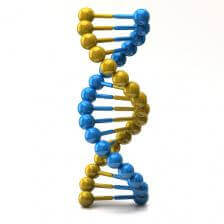Can Genetic Testing Reveal Your Ideal Diet?
Is the field of nutrigenomics real science or closer to science fiction?
Monica Reinagel, MS, LD/N, CNS
Listen
Can Genetic Testing Reveal Your Ideal Diet?

Here’s how it works: You swab the inside of your cheek with a Q-Tip and mail it to a lab. The lab analyzes the sample for a series of genetic variations that supposedly reveal your risk of certain diseases or explain why you can’t lose weight. Based on that, they provide a customized diet and supplement plan that will allegedly correct or compensate for any genetic weaknesses and help you lose weight and/or lower your risk of diseases. The test isn’t cheap–it’ll run you several hundred dollars. And the customized supplements are quite pricey as well. Is this a good investment in your health?>
What Do Your Genes Say About Your Health?
The goal of personalized medicine is not a bad one. It’s also not a new one. When health practitioners ask about your family history, they are seeking clues to your genetic background and using that information to customize treatment. If you have immediate family members who have had colon cancer, for example, your doctor might recommend earlier and more frequent screening for you than he or she would for someone with no such family history. If I see someone whose parents both had Type 2 diabetes, I know that person is at increased risk of developing diabetes and tailor my dietary advice accordingly. The idea is that no two humans are the same and the more information we can gather about a patient the better we’ll be able to treat him.
DNA-Driven Health Care?
Since the sequencing of the human genome, the hope has been that we will be able to personalize medicine like never before…reading your genes like a map, seeing exactly which diseases or conditions you’re likely to develop, how you’re likely to respond to various drugs, foods, or nutrients, and using that information to design a protocol just for you. And there’s no doubt that we’ve seen huge advances in genetic science, which allow us to treat patients more effectively.
Genetic testing can predict whether tumors are likely to be resistant or sensitive to certain chemotherapy agents, for example. On the other hand, our understanding of which genes are involved in the development of heart disease, Alzheimer’s, Type 2 diabetes, or even the tendency toward obesity—and how those genes interact with lifestyle factors such as diet and nutrition—is in its infancy.
For one thing, most conditions are influenced by dozens or even hundreds of genes. We may only know about one or two of them. Secondly, environmental factors, including diet and lifestyle, have an enormous impact on how or whether certain genes express themselves. In other words, your genes are not your destiny.
A patient with two diabetic parents may or may not have a genetic predisposition to Type 2 diabetes. Either way, I’d wager that the family’s eating habits and household food culture probably pose a larger threat. More importantly, genetic testing that revealed a Type 2 diabetes gene probably wouldn’t alter my advice in any significant way.
DNA-Based Nutrition: Leapfrogging the Science
Unfortunately, several companies have leapfrogged the scientific reality to get to the marketing opportunity.
Although your genes doubtless hold valuable information about your health, we’re still learning how to interpret that information. Credibility is stretched to the breaking point when companies claim to be able to put together genetically-tailored diet plans and nutritional supplements that will protect you against genetically predisposed diseases or—even more fantastically–compensate for a genetic variant that’s getting in the way of weight loss. There is simply no evidence to support this claim.
It’s possible that we will one day be able to customize our nutritional prescriptions based on genetic information. But that day—if it ever dawns—is still very far away. In the meantime, to paraphrase Dr. Helen Wallace of GeneWatch UK, tailoring your diet to your genetic make-up is about as scientific as tailoring your diet to your astrological sign.
For now, keep your money in your pocket, or better yet, spend it on some nice fruits and vegetables. DNA testing won’t tell you anything about what you should or shouldn’t be eating that you don’t know already.
Keep in Touch
If you have a suggestion for a future show topic or would like to find out about having me speak at your conference or event, send an email to nutrition@quickanddirtytips.comcreate new email or leave me a voice mail at 206-203-1438. You can also post comments and questions on my Nutrition Diva Facebook Page. I answer a lot of listener questions in my free weekly newsletter, so if you’ve sent a question my way, be sure you’re signed up to receive that.
Have a great week and remember to eat something good for me!
RESOURCES:

